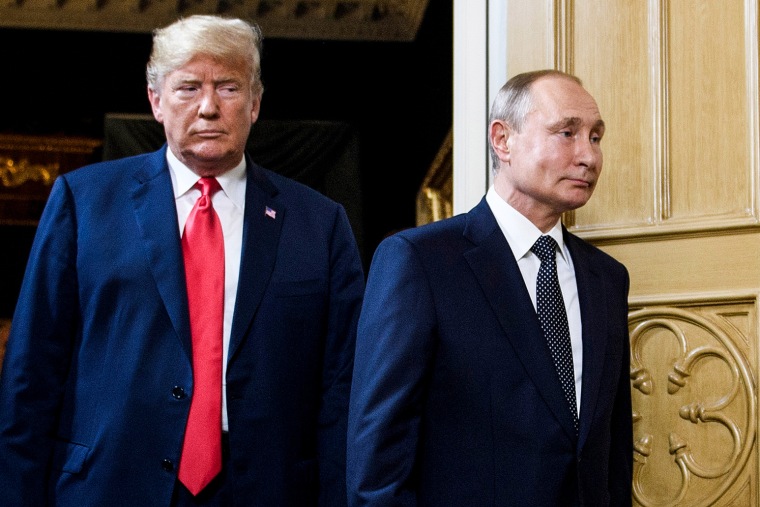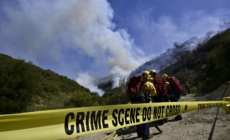-
Amid ICE raids, MLBPA advises players to keep legal documents with them - 10 mins ago
-
Harry Potter HBO TV Series Reboot: See Full Cast As Filming Begins - 11 mins ago
-
Federal judge reverses a CFPB rule to strip medical debt from credit reports. Here’s what it means. - 13 mins ago
-
Pro Bowl G Trey Smith, Chiefs Reportedly Agree to Mammoth Extension - 29 mins ago
-
In their own words: Unhoused people on Skid Row talk about current conditions - 50 mins ago
-
Wildfires Updates: Oregon, Colorado Blazes Spark Evacuations, Destroy More Than 40,000 Acres - 51 mins ago
-
Lowering your electric bill could be floating in the ocean - 59 mins ago
-
Woman fatally poisons estranged in-laws with mushroom-laced beef Wellington - about 1 hour ago
-
2025 MLB All-Star Game: Most Memorable All-Star Moments Throughout History - about 1 hour ago
-
Erotic ancient Roman mosaic looted by Nazi officer returned to Pompeii - about 1 hour ago
Russia shrugs off Trump’s threat of ‘very severe tariffs’
President Donald Trump may have expected a Russian shudder of fear to greet his threat of “very severe tariffs” on the country if it didn’t agree a ceasefire in Ukraine. Instead, his comments appear to have prompted a collective public shrug.
Calling Trump’s statements ‚Äúvery serious,‚Äù Kremlin spokesman Dmitry Peskov said on Tuesday that Russia needs ‚Äútime to analyze‚Äù them.
But investors in the Russian capital who had been gearing up for tougher measures instead embraced a 50-day grace period on tariffs set by Trump on Monday and the Moscow Stock Exchange was up by 2.7% after it opened Tuesday morning.
Oil prices also fell by more than $1 after the announcement, hinting that investors don’t think Trump will follow through on his threat to impose the tariffs.
Trump “did not announce any immediate anti-Russian measures or the confiscation of illegally blocked Russian assets,” Leonid Slutsky, a prominent nationalist politician, said on Telegram Tuesday, adding that the president was trying to balance Western support for Kyiv while avoiding a confrontation with the Kremlin.
Trump announced the levies along with the shipment of new weapons to Ukraine during a meeting with NATO Secretary General Mark Rutte at the White House on Monday.
His comments came as a bipartisan bill co-sponsored by Sen. Lindsey Graham (R-S.C.) made its way through Congress. If passed, it would seek to impose 500% tariffs on countries that buy Russian oil and gas.
Praising Trump’s announcement, Graham and his bill’s co-sponsor, Sen. Richard Blumenthal (D-Conn) said in a statement that “the ultimate hammer to bring about the end of this war will be tariffs against countries, like China, India and Brazil, that prop up Putin’s war machine by purchasing cheap Russian oil and gas.”
However, Konstantin Kosachev, the Deputy Chairman of the Russian Federation Council, the upper house of the country’s parliament, said Graham’s bill made “no sense.” In 50 days, “how much can change both on the battlefield and in the mood of those in power both in the U.S. and in NATO?” he added.
And former Russian President Dmitry Medvedev, a hardliner who frequently issues over-the-top threats, called Trump’s threat a “theatrical ultimatum” in a post on X.
“We’re going to be doing very severe tariffs if we don’t have a deal in 50 days, tariffs at about 100%,” Trump said, without providing further details.
After the announcement, a White House official said Trump’s threat of 100% tariffs was referring to Russian goods, as well as secondary sanctions on other countries that buy its exports.
The president’s comments signal a marked shift in tone over his Russian counterpart Vladimir Putin, for whom he has long shown admiration. “I’ve known him for a long time. We’ve always gotten along well,” Trump said back in March.

Many Western countries have have cut most of their own financial ties to Moscow during since Russia launched a full-scale invasion of its smaller neighbor, triggering the first major land war in Europe since World War II.
Still, buyers of Russia’s crude oil like China and India have continued financing Moscow‚Äôs war chest with hundreds of billions of dollars through business with the world‚Äôs third-largest oil producer.
“It’s about tariffs on countries like India and China that are buying their oil,” Matt Whitaker, the U.S. ambassador to NATO told reporters Monday after Trump’s announcement. “And it really is going to, I think, dramatically impact the Russian economy.”
Trump’s threats of secondary tariffs are “never going to go anywhere” as long as he is unwilling to impose costs on Moscow directly, Keir Giles, a senior fellow at the London-based Chatham House think tank, told NBC News Monday.
The tariffs also risk upending delicate China-U.S. trade talks, according to Liu Baocheng at Beijing’s University of International Business and Economics.
The ‚Äúunilateral imposition of punitive trade measures…risks creating new and unnecessary complications,‚Äù Baocheng said, adding that the 100% secondary tariffs intended to pressure Moscow could instead ‚Äúseverely backfire by undermining global economic stability and fragmenting international cooperation.‚Äù
Most concerning, Baocheng added, was that the threat comes at a delicate juncture in U.S.-China trade relations, where secondary tariffs on Chinese companies or sectors that import Russian goods “would seriously damage the fragile momentum of dialogue.”
Trump’s tariff agenda has also raised the stakes for India, which has been negotiating a trade deal with Washington to see tariffs on goods from India drop below 20%.
India’s External Affairs Minister S. Jaishankar told reporters Tuesday that his country had “been in touch” with Graham over its concerns and interests on energy and security.
Elsewhere, Europe‚Äôs chief negotiator Maro≈° ≈Ýefƒçoviƒç told reporters in Brussels on Monday that a 30% tariff on European goods would have a ‚Äúhuge impact on trade.‚Äù
‚ÄúIt will be almost impossible to continue trading as we are used to in a transatlantic relationship,‚Äù ≈Ýefƒçoviƒç said.
Source link






























